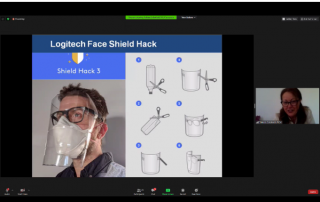After Prof. Etzkowitz pointed out the relation between the impacts of Covid-19 and Triple Helix, Prof. Corpakis further presented the Covid-19 shock and the responses from Triple Helix respectively. Dr. Corpakis highlighted that in Europe academics have been taking front seats to advise the government, even though the governments may take or deny their advice. And in the post Covid-19 world, business and industry are facing the biggest shock and loss. It is high time now for us to consider in what ways we can better coordinate the Triple Helix to support regional development in the next phase.

Chair Prof. Dimitri Corpakis presented on Covid-19 Shock and Triple Helix
Prof. Tatiana Schofield, Head of Knowledge Exchange at the Royal College of Art (RCA), UK, anchored Prof. Corpakis’s observation about academics taking the front seats in Europe. She used the case of RCA to further demonstrate the innovative approaches by students, researchers and alumni in RCA to cope with Covid-19.

Panelist Prof. Tatiana Schofield presented innovation by academics and students in RCAto cope with Covid-19
Mr. Rahmat Ullah, Executive Director of Institute of Research Promotion, University of Sialkot Pakistan, shared the experiences in Pakistan. His speech called for more attention to the development of social sciences, especially when it is urgently needed in dealing with the public health crisis.
After the speeches by each panelist, keynote speakers and panelists continued to discuss more in detail on the responses of Triple Helix in different regions in the world, especially in the U.S., the U.K. Continental Europe and Asia. The section ended with discussion on the relation between global warming and the Covid-19. “The two issues are interrelated. To tackle them, we need to protect our environment. We also need to come together, and become stronger together.We should forget all the cultural and racial barriers, ad build a better future together”, said by Prof. Schofield.

Panelist Prof. Schofield
Text and photos: Gaoming Zheng

